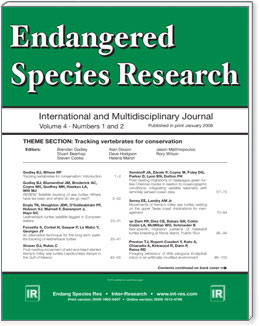
Endangered Species Research (ESR)
ESR contains relevant information for managers of protected areas containing threatened and endangered species. You can also engage ESR on Facebook: https://www.facebook.com/EndangeredSpeciesResearch/ or Twitter @BrendanGodley where articles are shared extensively. #ESR
Articles Relevant to the Pacific During 2014-2016
ESR articles 2016
OVERVIEW: Geospatial approaches to support pelagic conservation planning and adaptive managementESR 30:1-9 <http://www.int-res.com/abstracts/esr/v30/p1-9/>
Can you hear me here? Managing acoustic habitat in US waters ESR 30:171-186 <http://www.int-res.com/abstracts/esr/v30/p171-186/>
First satellite tracks of the Endangered black-capped petrel ESR 29:23-33 <http://www.int-res.com/abstracts/esr/v29/n1/p23-33/>
Identifying critical areas to reduce bycatch of coastal common bottlenose dolphins Tursiops truncatus in artisanal fisheries of the subtropical western South Atlantic ESR 29:35-50 <http://www.int-res.com/abstracts/esr/v29/n1/p35-50/>
Migrating humpback whales show no detectable response to whale alarms off Sydney, Australia ESR 29:201-209 <http://www.int-res.com/abstracts/esr/v29/n3/p201-209/>
Gray whale densities during a seismic survey off Sakhalin Island, Russia ESR 29:211-227 <http://www.int-res.com/abstracts/esr/v29/n3/p211-227/>
Factors influencing heterogeneity in female reproductive success in a Critically Endangered population of bottlenose dolphins ESR 29:255-270 <http://www.int-res.com/abstracts/esr/v29/n3/p255-270/>
Monitoring the gray whale sound exposure mitigation zone and estimating acoustic transmission during a 4-D seismic survey, Sakhalin Island, Russia ESR 29:131-146 <http://www.int-res.com/abstracts/esr/v29/n2/p131-146/>
Delineation of a coastal gray whale feeding area using opportunistic and systematic survey effort ESR 29:147-160 <http://www.int-res.com/abstracts/esr/v29/n2/p147-160/>
Distance from shore as an indicator of disturbance of gray whales during a seismic survey off Sakhalin Island, Russia ESR 29:161-178 <http://www.int-res.com/abstracts/esr/v29/n2/p161-178/>
Expert elicitation of seasonal abundance of North Atlantic right whales Eubalaena glacialis in the mid-Atlantic ESR 29:51-58 <http://www.int-res.com/abstracts/esr/v29/n1/p51-58/>
How much sea turtle bycatch is too much? A stationary age distribution model for simulating population abundance and potential biological removal in the Mediterranean ESR 29:239-254 <http://www.int-res.com/abstracts/esr/v29/n3/p239-254/>
International movements of adult female leatherback turtles in the Caribbean: results from tag recovery data (2002−2013) ESR 29:279-287 <http://www.int-res.com/abstracts/esr/v29/n3/p279-287/>
Population trends and survival of nesting green sea turtles Chelonia mydas on Aves Island, Venezuela ESR 29:103-116 <http://www.int-res.com/abstracts/esr/v29/n2/p103-116/>
Hawksbill nest site selection affects hatchling survival at a rookery in Antigua, West Indies ESR 29:179-187 <http://www.int-res.com/abstracts/esr/v29/n2/p179-187/>
Sea turtle rehabilitation success increases with body size and differs among species ESR 29:13-21 <http://www.int-res.com/abstracts/esr/v29/n1/p13-21/>
NOTE: Are we missing important areas in pelagic marine conservation? Redefining conservation hotspots in the ocean ESR 29:229-237 <http://www.int-res.com/abstracts/esr/v29/n3/p229-237/>
ESR articles 2015
Optimizing the productivity of a coral nursery focused on staghorn coral Acropora cervicornis ESR 27:243-250 <http://www.int-res.com/abstracts/esr/v27/n3/p243-250/>
Effects of bycatch on the population viability of the narrow-ridged finless porpoises in Ariake Sound and Tachibana Bay, Japan ESR 27:87-94 <http://www.int-res.com/abstracts/esr/v27/n1/p87-94/>
Mitigating the bycatch of giant cuttlefish Sepia apama and blue swimmer crabs Portunus armatus in an Australian penaeid-trawl fishery ESR 26:161-166 <http://www.int-res.com/abstracts/esr/v26/n2/p161-166/>
Pragmatic approaches for effective management of pelagic marine protected areas ESR 26:59-74 <http://www.int-res.com/abstracts/esr/v26/n1/p59-74/>
NOTE: Microsatellite variation and rare alleles in a bottlenecked Hawaiian Islands endemic: implications for reintroductions ESR 28:117-122 <http://www.int-res.com/abstracts/esr/v28/n2/p117-122/>
DNA from historical and trophy samples provides insights into white shark population origins and genetic diversity ESR 27:233-241 <http://www.int-res.com/abstracts/esr/v27/n3/p233-241/>
Behaviour of aggregated grey nurse sharks Carcharias taurus off eastern Australia: similarities and differences among life-history stages and sites ESR 27:69-85 <http://www.int-res.com/abstracts/esr/v27/n1/p69-85/>
Effects of barium-ferrite permanent magnets on great hammerhead shark Sphyrna mokarran behavior and implications for future conservation technologies ESR 26:243-256 <http://www.int-res.com/abstracts/esr/v26/n3/p243-256/>
Monitoring and impact mitigation during a 4D seismic survey near a population of gray whales off Sakhalin Island, Russia ESR 28:187-208 <http://www.int-res.com/abstracts/esr/v28/n3/p187-208/>
North Atlantic right whale occurrence near wind energy areas along the mid-Atlantic US coast: implications for management ESR 28:225-234 <http://www.int-res.com/abstracts/esr/v28/n3/p225-234/>
Variability in haul-out behaviour by male Australian sea lions Neophoca cinerea in the Perth metropolitan area, Western Australia ESR 28:259-274 <http://www.int-res.com/abstracts/esr/v28/n3/p259-274/>
False killer whale and short-finned pilot whale acoustic identification ESR 28:97-108 <http://www.int-res.com/abstracts/esr/v28/n2/p97-108/>
Assessing the design and power of capture−recapture studies to estimate demographic parameters for the Endangered Oceania humpback whale population ESR 28:147-162 <http://www.int-res.com/abstracts/esr/v28/n2/p147-162/>
Seven years of blue and fin whale call abundance in the Southern California Bight ESR 28:61-76 <http://www.int-res.com/abstracts/esr/v28/n1/p61-76/>
Conflicting rates of increase in the sperm whale population of the eastern Caribbean: positive observed rates do not reflect a healthy population ESR 27:207-218 <http://www.int-res.com/abstracts/esr/v27/n3/p207-218/>
Simultaneous tracking of blue whales and large ships demonstrates limited behavioral responses for avoiding collision ESR 27:219-232 <http://www.int-res.com/abstracts/esr/v27/n3/p219-232/>
Umbrella species in marine systems: using the endangered humphead wrasse to conserve coral reefs ESR 27:251-263 <http://www.int-res.com/abstracts/esr/v27/n3/p251-263/>
NOTE: Key research questions of global importance for cetacean conservation ESR 27:113-118 <http://www.int-res.com/abstracts/esr/v27/n2/p113-118/>
Habitat-based models of cetacean density and distribution in the central North Pacific ESR 27:1-20 <http://www.int-res.com/abstracts/esr/v27/n1/p1-20/>
Long-term individual sighting history database: an effective tool to monitor satellite tag effects on cetaceans ESR 26:235-241 <http://www.int-res.com/abstracts/esr/v26/n3/p235-241/>
Validating the reliability of passive acoustic localisation: a novel method for encountering rare and remote Antarctic blue whales ESR 26:257-269 <http://www.int-res.com/abstracts/esr/v26/n3/p257-269/>
North Atlantic right whale Eubalaena glacialis vocalization patterns in the central Gulf of Maine from October 2009 through October 2010 ESR 26:271-280 <http://www.int-res.com/abstracts/esr/v26/n3/p271-280/>
Sei whale movements and behaviour in the North Atlantic inferred from satellite telemetry ESR 26:103-113 <http://www.int-res.com/abstracts/esr/v26/n2/p103-113/>
Incremental fishing gear modifications fail to significantly reduce large whale serious injury rates ESR 26:115-126 <http://www.int-res.com/abstracts/esr/v26/n2/p115-126/>
Issues and opportunities associated with using manatee mortality data to evaluate the effectiveness of manatee protection efforts in Florida ESR 26:127-136 <http://www.int-res.com/abstracts/esr/v26/n2/p127-136/>
Population trends and vulnerability of humpback dolphins Sousa chinensis off the west coast of Taiwan ESR 26:147-159 <http://www.int-res.com/abstracts/esr/v26/n2/p147-159/>
Effect of rainfall on loggerhead turtle nest temperatures, sand temperatures and hatchling sex ESR 28:235-247 <http://www.int-res.com/abstracts/esr/v28/n3/p235-247/>
Quantifying chelonid herpesvirus 5 in symptomatic and asymptomatic rehabilitating green sea turtles ESR 28:135-146 <http://www.int-res.com/abstracts/esr/v28/n2/p135-146/>
A Population structure of marine turtles in coastal waters of Qatar ESR 28:163-174 <http://www.int-res.com/abstracts/esr/v28/n2/p163-174/>
Summer-restricted migration of green turtles Chelonia mydas to a temperate habitat of the northwest Pacific Ocean ESR 28:1-10 <http://www.int-res.com/abstracts/esr/v28/n1/p1-10/>
Seasonality, abundance, and fifteen-year trend in green turtle nesting activity at Itsamia, Moheli, ComorosESR 27:265-276 <http://www.int-res.com/abstracts/esr/v27/n3/p265-276/>
Evaluating the importance of Marine Protected Areas for the conservation of hawksbill turtles Eretmochelys imbricata nesting in the Dominican Republic ESR 27:169-180 <http://www.int-res.com/abstracts/esr/v27/n2/p169-180/>
Sea turtle hatchling production from Florida (USA) beaches, 2002−2012, with recommendations for analyzing hatching success ESR 27:53-68 <http://www.int-res.com/abstracts/esr/v27/n1/p53-68/>
Effectiveness of recreational divers for monitoring sea turtle populations ESR 26:209-219 <http://www.int-res.com/abstracts/esr/v26/n3/p209-219/>
Dispersal and dive patterns during the post-nesting migration of olive ridley turtles from French Guiana ESR 26:221-234 <http://www.int-res.com/abstracts/esr/v26/n3/p221-234/>
Recognition of juvenile hawksbills Eretmochelys imbricata through face scale digitization and automated searching ESR 26:137-146 <http://www.int-res.com/abstracts/esr/v26/n2/p137-146/>
Individual differences in activity and habitat selection of juvenile queen conch evaluated using acceleration biologgers ESR 27:181-188 <http://www.int-res.com/abstracts/esr/v27/n2/p181-188/>
Quantitative estimates of the movement and distribution of North Atlantic right whales along the northeast coast of North America ESR 27:141-154 <http://www.int-res.com/abstracts/esr/v27/n2/p141-154/>
ESR articles 2014
Using integrated land- and boat-based surveys to inform conservation of the Critically Endangered Balearic shearwater ESR 25:1-18 <http://www.int-res.com/abstracts/esr/v25/n1/p1-18/>
Stage-dependent distribution of the Critically Endangered Amsterdam albatross in relation to Economic Exclusive Zones ESR 23:263-276 <http://www.int-res.com/abstracts/esr/v23/n3/p263-276/>
Using observed seabird fallout records to infer patterns of attraction to artificial light ESR 22:225-234 <http://www.int-res.com/abstracts/esr/v22/n3/p225-234/>
Foraging range and habitat associations of non-breeding Tristan albatrosses: overlap with fisheries and implications for conservation ESR 22:39-49 <http://www.int-res.com/abstracts/esr/v22/n1/p39-49/>
Seasonal co-occurrence of sea turtles, bottlenose dolphins, and commercial gill nets in southern Pamlico and northern Core Sounds, and adjacent coastal waters of North Carolina, USA ESR 22:235-249 <http://www.int-res.com/abstracts/esr/v22/n3/p235-249/>
Refinement of bycatch reduction devices to exclude freshwater turtles from commercial fishing nets ESR 22:251-261 <http://www.int-res.com/abstracts/esr/v22/n3/p251-261/>
Patterns of extirpation. II. The role of connectivity in the decline and recovery of elasmobranch populations in the German Bight as inferred from survey data ESR 25:209-223 <http://www.int-res.com/abstracts/esr/v25/n3/p209-223/>
Dietary overlap and partitioning among three sympatric carcharhinid sharks ESR 25:283-293 <http://www.int-res.com/abstracts/esr/v25/n3/p283-293/>
Genetic structure and diversity of two highly vulnerable carcharhinids in Australian watersESR 24:45-60 <http://www.int-res.com/abstracts/esr/v24/n1/p45-60/>
Geospatial analysis of habitat use by silver hake Merluccius bilinearis in the Gulf of Maine ESR 23:219-227 <http://www.int-res.com/abstracts/esr/v23/n3/p219-227/>
Movement, depth and temperature preferences of an important bycatch species, Arctic skate Amblyraja hyperborea, in Cumberland Sound, Canadian Arctic ESR 23:229-240 <http://www.int-res.com/abstracts/esr/v23/n3/p229-240/>
Population density and abundance of basking sharks Cetorhinus maximus in the lower Bay of Fundy, Canada ESR 23:177-185 <http://www.int-res.com/abstracts/esr/v23/n2/p177-185/>
Movement patterns and habitat selection of the Endangered eastern freshwater cod Maccullochella ikei in the Mann River, Australia ESR 23:35-49 <http://www.int-res.com/abstracts/esr/v23/n1/p35-49/>
Effectiveness of lionfish removal efforts in the southern Caribbean ESR 22:175-182 <http://www.int-res.com/abstracts/esr/v22/n2/p175-182/>
Population structure and intergeneric hybridization in harbour porpoises Phocoena phocoena in British Columbia, Canada ESR 26:1-12 <http://www.int-res.com/abstracts/esr/v26/n1/p1-12/>
Recent increases in survival of western Steller sea lions in Alaska and implications for recovery ESR 26:13-24 <http://www.int-res.com/abstracts/esr/v26/n1/p13-24/>
Where the whales are: using habitat modeling to support changes in shipping regulations within National Marine Sanctuaries in Central California ESR 26:39-57 <http://www.int-res.com/abstracts/esr/v26/n1/p39-57/>
NOTE: Critically low abundance and limits to human-related mortality for the Maui’s dolphin ESR 26:87-92 <http://www.int-res.com/abstracts/esr/v26/n1/p87-92/>
Distribution of Soviet catches of sperm whales Physeter macrocephalus in the North Pacific ESR 25:249-263 <http://www.int-res.com/abstracts/esr/v25/n3/p249-263/>
Energy content of Pacific salmon as prey of northern and southern resident killer whales ESR 25:265-281 <http://www.int-res.com/abstracts/esr/v25/n3/p265-281/>
Overlooking a potential hotspot at Great Barrier Island for the nationally endangered bottlenose dolphin of New Zealand ESR 25:97-114 <http://www.int-res.com/abstracts/esr/v25/n2/p97-114/>
Passive acoustic monitoring on the North Atlantic right whale calving grounds ESR 25:115-140 <http://www.int-res.com/abstracts/esr/v25/n2/p115-140/>
Improved abundance and trend estimates for sperm whales in the eastern North Pacific from Bayesian hierarchical modeling ESR 25:141-150 <http://www.int-res.com/abstracts/esr/v25/n2/p141-150/>
Genetic evidence reveals a unique lineage of Bryde’s whales in the northern Gulf of Mexico ESR 25:19-34 <http://www.int-res.com/abstracts/esr/v25/n1/p19-34/>
A whale alarm fails to deter migrating humpback whales: an empirical test ESR 25:35-42 <http://www.int-res.com/abstracts/esr/v25/n1/p35-42/>
Benefits derived from opportunistic survival-enhancing interventions for the Hawaiian monk seal: the silver BB paradigm ESR 25:89-96 <http://www.int-res.com/abstracts/esr/v25/n1/p89-96/>
Effects of boats on the surface and acoustic behaviour of an endangered population of bottlenose dolphins ESR 24:221-236 <http://www.int-res.com/abstracts/esr/v24/n3/p221-236/>
Modeling habitat and bycatch risk for dugongs in Sabah, Malaysia ESR 24:237-247 <http://www.int-res.com/abstracts/esr/v24/n3/p237-247/>
Geographic variation of persistent organic pollutants in Hawaiian monk seals Monachus schauinslandi in the main Hawaiian Islands ESR 24:249-262 <http://www.int-res.com/abstracts/esr/v24/n3/p249-262/>
Viability of the Critically Endangered eastern Taiwan Strait population of Indo-Pacific humpback dolphins Sousa chinensis ESR 24:263-271 <http://www.int-res.com/abstracts/esr/v24/n3/p263-271/>
Depredating sperm whales in the Gulf of Alaska: local habitat use and long distance movements across putative population boundaries ESR 24:125-135
Environment-driven changes in terrestrial habitat use and distribution of the Galapagos sea lion ESR 24:9-19 <http://www.int-res.com/abstracts/esr/v24/n1/p9-19/>
Modeling the distribution of the North Atlantic right whale Eubalaena glacialis off coastal Maine by areal co-kriging ESR 24:21-31 <http://www.int-res.com/abstracts/esr/v24/n1/p21-31/>
No evidence for recovery in the population of sperm whale bulls off Western Australia, 30 years post-whaling ESR 24:33-43 <http://www.int-res.com/abstracts/esr/v24/n1/p33-43/>
Population trends of the Kuril harbour seal Phoca vitulina stejnegeri from 1974 to 2010 in southeastern Hokkaido, Japan ESR 24:61-72 <http://www.int-res.com/abstracts/esr/v24/n1/p61-72/>
A new song recorded from blue whales in the Corcovado Gulf, Southern Chile, and an acoustic link to the Eastern Tropical Pacific ESR 23:241-252 <http://www.int-res.com/abstracts/esr/v23/n3/p241-252/>
Fin whale survival and abundance in the Gulf of St. Lawrence, Canada ESR 23:125-132 <http://www.int-res.com/abstracts/esr/v23/n2/p125-132/>
Effectiveness of mandatory vessel speed limits for protecting North Atlantic right whales ESR 23:133-147 <http://www.int-res.com/abstracts/esr/v23/n2/p133-147/>
Individual variation in movements of satellite-tracked humpback whales Megaptera novaeangliae in the eastern Aleutian Islands and Bering Sea ESR 23:187-195 <http://www.int-res.com/abstracts/esr/v23/n2/p187-195/>
Predicting seasonal density patterns of California cetaceans based on habitat models ESR 23:1-22 <http://www.int-res.com/abstracts/esr/v23/n1/p1-22/>
Capture-mark-recapture modelling suggests an Endangered status for the Mayotte Island (eastern Africa) population of Indo-Pacific bottlenose dolphins ESR 23:23-33 <http://www.int-res.com/abstracts/esr/v23/n1/p23-33/>
OVERVIEW: Marine mammal habitat models come of age: the emergence of ecological and management relevance ESR 22:205-212 <http://www.int-res.com/abstracts/esr/v22/n3/p205-212/>
AS WE SEE IT: Beyond correlation: integrating environmentally and behaviourally mediated processes in models of marine mammal distributions ESR 22:191-203 <http://www.int-res.com/abstracts/esr/v22/n3/p191-203/>
Levels of persistent organic pollutants in eastern North Atlantic humpback whales ESR 22:213-223 <http://www.int-res.com/abstracts/esr/v22/n3/p213-223/>
Impacts of fisheries on the Critically Endangered humpback dolphin Sousa chinensis population in the eastern Taiwan Strait ESR 22:99-114 <http://www.int-res.com/abstracts/esr/v22/n2/p99-114/>
Haulout patterns of Saimaa ringed seals and their response to boat traffic during the moulting season ESR 22:115-124 <http://www.int-res.com/abstracts/esr/v22/n2/p115-124/>
Using drifting passive echolocation loggers to study harbour porpoises in tidal-stream habitats ESR 22:125-143 <http://www.int-res.com/abstracts/esr/v22/n2/p125-143/>
Reproductive parameters of eastern North Pacific blue whales Balaenoptera musculus ESR 22:23-31 <http://www.int-res.com/abstracts/esr/v22/n1/p23-31/>
NOTE: Evidence of spatial structuring of eastern South Pacific humpback whale feeding grounds ESR 22:33-38 <http://www.int-res.com/abstracts/esr/v22/n1/p33-38/>
Variation of bowhead whale progesterone concentrations across demographic groups and sample matricesESR 22:61-72 <http://www.int-res.com/abstracts/esr/v22/n1/p61-72/>
Inter-nesting distribution of flatback turtles Natator depressus and industrial development in Western Australia ESR 26:25-38 <http://www.int-res.com/abstracts/esr/v26/n1/p25-38/>
REVIEW: Thermal tolerances of sea turtle embryos: current understanding and future directions ESR 26:75-86 <http://www.int-res.com/abstracts/esr/v26/n1/p75-86/>
Site fidelity, ontogenetic shift and diet composition of green turtles Chelonia mydas in Japan inferred from stable isotope analysis ESR 25:151-164 <http://www.int-res.com/abstracts/esr/v25/n2/p151-164/>
Variation in age and size at sexual maturity in Kemp’s ridley sea turtles ESR 25:57-67 <http://www.int-res.com/abstracts/esr/v25/n1/p57-67/>
Evaluation of scute thickness to infer life history records in the carapace of green and loggerhead turtles ESR 24:191-196 <http://www.int-res.com/abstracts/esr/v24/n3/p191-196/>
Multidecadal trends in the nesting phenology of Pacific and Atlantic leatherback turtles are associated with population demography ESR 24:197-206 <http://www.int-res.com/abstracts/esr/v24/n3/p197-206/>
Loggerhead sea turtle abundance at a foraging hotspot in the eastern Pacific Ocean: implications for at-sea conservation ESR 24:207-220 <http://www.int-res.com/abstracts/esr/v24/n3/p207-220/>
JA Use of a towed camera system to investigate benthic habitat use by inter-nesting female hawksbill sea turtles ESR 24:159-170 <http://www.int-res.com/abstracts/esr/v24/n2/p159-170/>
Juvenile green turtles on the northern edge of their range: mtDNA evidence of long-distance westward dispersals in the northern Pacific Ocean ESR 24:171-179 <http://www.int-res.com/abstracts/esr/v24/n2/p171-179/>
Genetic composition of loggerhead turtle feeding aggregations: migration patterns in the North Pacific ESR 24:85-93 <http://www.int-res.com/abstracts/esr/v24/n1/p85-93/>
Reproductive biology of the flatback turtle Natator depressus in Western Australia ESR 23:115-123 <http://www.int-res.com/abstracts/esr/v23/n2/p115-123/>
Age-size relationship at reproduction of South African female loggerhead turtles Caretta caretta ESR 23:167-175 <http://www.int-res.com/abstracts/esr/v23/n2/p167-175/>
Perspectives of fishers on turtle bycatch and conservation strategies in a small-scale inland commercial fyke net fishery ESR 22:11-22 <http://www.int-res.com/abstracts/esr/v22/n1/p11-22/>
Genetic stock composition of loggerhead turtles Caretta caretta bycaught in the pelagic waters of the North Atlantic ESR 22:73-84 <http://www.int-res.com/abstracts/esr/v22/n1/p73-84/>
Impact of an invasive predatory lizard on the endangered Hawaiian tree snail Achatinella mustelina: a threat assessment ESR 24:115-123 <http://www.int-res.com/abstracts/esr/v24/n2/p115-123/>
Pragmatic approaches for effective management of pelagic marine protected areas ESR 26:59-74 <http://www.int-res.com/abstracts/esr/v26/n1/p59-74/>
Global research priorities to mitigate plastic pollution impacts on marine wildlifeESR 25:225-247 <http://www.int-res.com/abstracts/esr/v25/n3/p225-247/>









